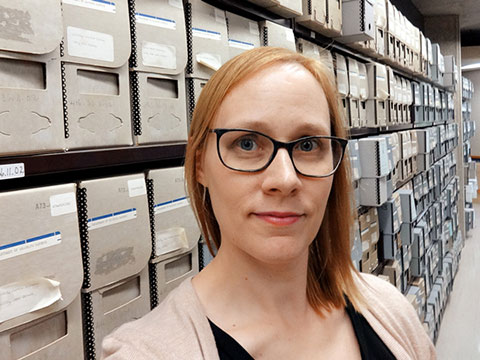Can you describe your job?
I’m responsible for acquiring records at the archives and preserving, arranging and describing them, and making them accessible to researchers. The U of T archives collects university records from offices, faculties and governance bodies – and from individuals and organizations associated with U of T. I work closely with faculty members who are donating their papers. I recently worked on physicist and metallurgist Ursula Franklin’s records, and philosopher Ian Hacking’s records are next on my list. I also do social media and other outreach, like class instruction.
U of T Archives is on Facebook, Twitter and Instagram. What are you trying to accomplish with your social media platforms?
The number one message is: We exist. A lot of people don’t know what the U of T Archives is. On April Fool’s Day last year, I did fake post that we had turned the Reading Room into a cat café, and I photoshopped all these cats into a Reading Room picture. It was the university archivist’s idea; we’re all cat-obsessed. It was our most popular post. It doesn’t do a lot of education, but because it got so many shares it was good for our profile.
I also try to showcase all of the resources we have, to encourage people to visit. We have 300,000 photos, but we also have 11 kilometres of textual records. We’re a place where someone can come and write a scholarly book or thesis based on the material we have.
And it isn’t just promotion: we’re making U of T’s history more widely accessible. Rather than waiting for researchers to come to us, we’re pushing it out there to them.
U of T Archives recently celebrated its 50th anniversary. How has the role of archivist changed over the past decade or so?
One shift is to the electronic, for sure. Not just in terms of how we’re delivering material to our audiences or researchers, but we are now responsible for preserving born-digital records – things like emails and word documents. We have presidents’ correspondence going back to the beginning. Now the president’s correspondence is mostly over email. The problem with born-digital records is that the technology quickly becomes outdated. That means archivists need to get involved with the people who are making records much earlier to make sure that we acquire them and start to manage them before they become obsolete. That’s a huge challenge for the profession.
What is your favourite part of your job?
It is the outreach. Recently, a student from the Faculty of Medicine came in whose grandmother had also been a student. I was able to pull her grandmother’s file: it had newspaper clippings, photos of her wedding day and a document that she had signed. She could connect to her own family’s experience through the records. I like those moments. It’s nice to be able to put those things in front of people and watch them get excited about it.
Does this sense of connection ever happen on social media?
You don’t always get the feedback, but there are moments of connection like when I posted mathematician John Field’s notebooks, and someone from The Fields Institute tweeted at us and said, ‘Oh, I didn’t realize you had that’ and asked to come in and look at them. My favourite thing on Instagram is when people tag other people, because I think that’s more than just saying, ‘Oh wow, cool.’ People are saying, ‘Hey, you, check this out.’
Which of the archives’ social media accounts is your favourite?
I’ve always loved photography, so I really enjoy curating our Instagram account. As our feed grows and you can look through all these little square images, you see the history of U of T before your eyes.
I think sometimes people feel intimidated by the archives. Can you counteract this at all on social media?
I share photos of our space and the day-to-day of what we get up to in order to demystify the archives. When we had to move the Dunlap Observatory’s giant scrapbook up to the observatory for its anniversary, I took a time-lapse video of the archivists wrapping the book up with bubble tape. I want to do more behind-the-scenes posts. It puts a human face on what we do.
Check out @UTArchives on Twitter.





